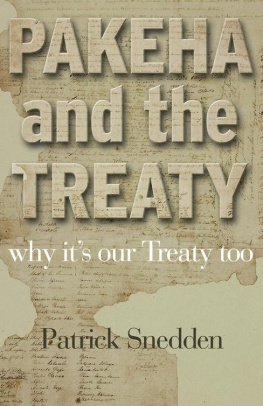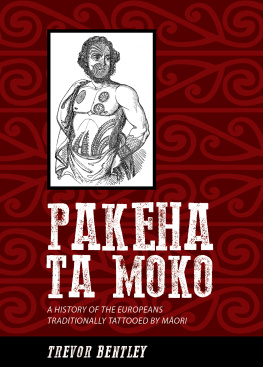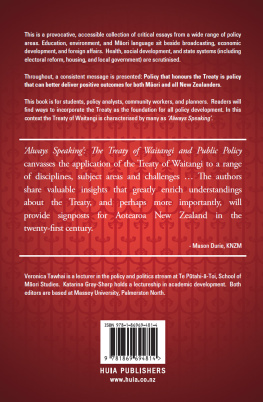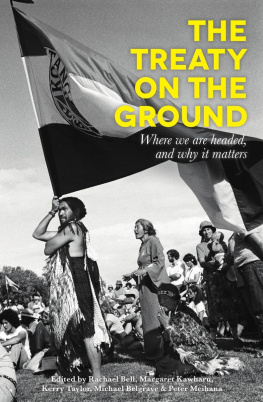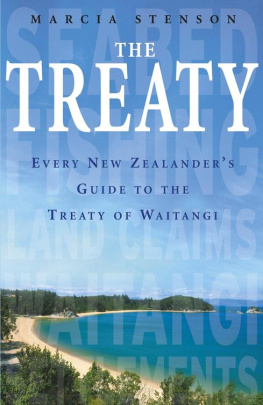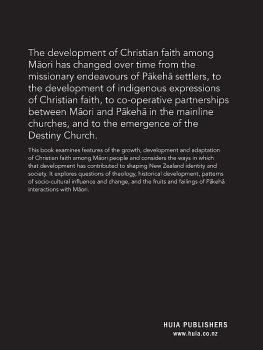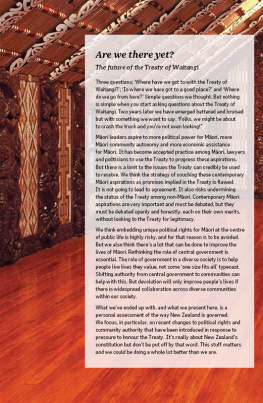It is not unusual for a book of personal opinion to require a disclaimer, especially when the author has multiple roles in his non-literary life. So if the point needs to be made, then I will make it emphatically. All the material in this book, representing views both of substance and of error, is mine. Except insofar as colleagues may enter the narrative and be directly quoted in the text, none of what I have written in any way whatsoever purports to represent the positions which are or might be held by my colleagues in any capacity within any of the organisations, companies or institutions, both public and private, with whom I have a commercial relationship. These are my own views as a private citizen, not as a corporate director or a representative of any other organisation.
1 Growing up Pakeha Part I
An ordinary life
2 Growing up Pakeha Part II
Arrested development
3 Belonging and te tino rangatiratanga
Different sides of the same coin
4 Need versus race
Dual world-views on the road to cultural recovery
5 Our stories are our way forward
The Tribunal is building a national legacy
6 Anatomy of a protest
Lessons from Pakaitore and Maioro
7 A Treaty-based approach that works for us all
Health Care Aotearoa and the primary health organisation (PHO) revolution
8 Reconciling ownership and mana
Speaking past each other on the foreshore
9 Imagining the future with Article 2
From Treaty truth-telling to Treaty fulfilment
There is a photograph of my wife, Josephine, with our children when they were very young, sitting on the fenceline outside our house in Grey Lynn, Auckland. They are surrounded by our neighbours, recent refugees from Cambodia, and Naresh Soma, his wife, Usha, and their kids. Naresh is a third-generation New Zealand Indian whose family were originally from Gujarat province, and Usha was born in South Africa, grew up in England and came here after she and her husband married. Look over Jos head to the right, and you will see affixed to the house a nuclear-free sign. The scene is relaxed, cheerful and inclusive.
When I am asked what it is to be a New Zealander, that image acts as a starting point for many of my cultural touchstones. God only knows what my forebears thought they were doing leaving Scotland and Ireland in the 1850s and 60s. In truth they had no idea what they were coming to, but they were clear why they were leaving. The religious, cultural and economic persecution was motivation enough to up stakes and leave, and to risk starting over in a country with people and customs not their own. In our brief occupation of this country as Pakeha this story has been told time and again, as migrants from all over the world decided that life in this colonial backwater was worth a punt.
Such was also the case for our Cambodian friends. They had left lives too ghastly for us to imagine, arriving without money, language, friends or local knowledge. Like my own ancestors, these people are cultural heroes. They have gone where few before them have been, and they have survived, and now flourish. Among these people I also count my friend Samadi, from Afghanistan, a government official who defected during the Russian invasion of his country. Through luck, guts and a lot of help from New Zealand friends, Samadi arrived here just over twenty years ago when there were no other Afghani in Auckland. A year later he was joined by his wife, Golbibi, and their seven children. On his first night at home with our family our four- year-old son sat on his lap and demanded Samadi read to him Winnie the Pooh an impossible task, given his grasp of the language. Years later, he still recalls that simple demand as his first invitation to belong in his new country. Now that family has five university degrees among its kids and the next generation is helping to populate our country. For years the local food cooperative of twenty families slipped in a couple of extra Kleensaks of vegetables for the Samadis. No big fuss. Just the ordinary kindness of decent people.
Declaring our house nuclear-free didnt feature on the US or Russian radar screen, but David Lange did. The extraordinary audacity of this New Zealander in addressing his opening remarks at the Oxford Union debate directly to the President of the United States created an indelible impression. The fact that we dont count in world affairs does not buy our silence. Punching above your weight is a metaphor custom-built for New Zealanders and we let everybody know it, more often than not in a shy, unassuming sort of a way.
But it was the events of January 2004 that forced me to take stock of the nature of my own belonging in this country. How did I arrive, what authenticates my right to be here, what continues to tie me here, and how different am I from the forebears who preceded me?
Dr Don Brashs speech at Orewa that month fundamentally distanced him and his party from the idea of any on-going place for the Treaty of Waitangi, once claims were settled. His critique of Maori preference touched a nerve in New Zealand, particularly with Pakeha.
It was as if the time was right for a gloves-off conversation about our origins, our future and ourselves. As the talk began, especially in those early months of February and March 2004, there was an outpouring of angst about the state of race relations in this country.
For Maori, many of whom felt themselves to be the butt of this angst, this time was one of deep discomfort. When the foreshore and seabed was added to this national self-examination , there could be only one option for me. With Maori cousins on both sides of my family and thirty years of involvement with Maori communities in most parts of New Zealand, I decided I had to be in on this national discussion. Any experience I had gleaned could not be wasted. I was not prepared to remain privately agitated while publicly mute.

